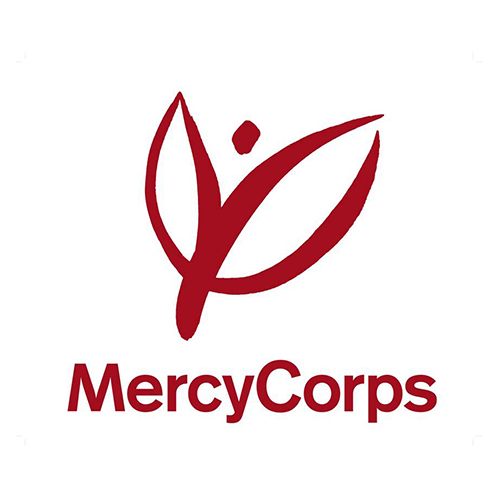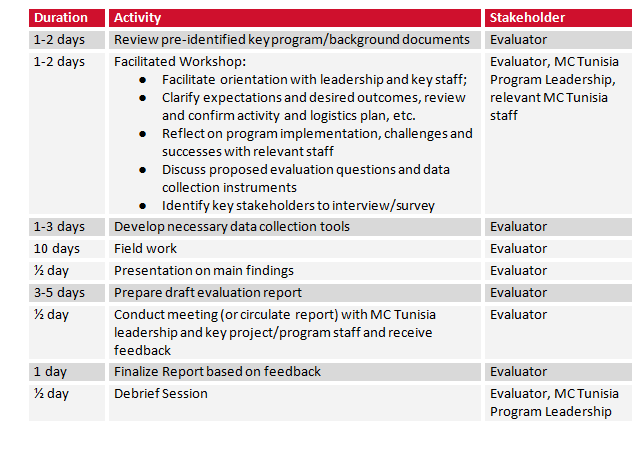(Offre en anglais) Mercy Corps lance un appel à consultation pour “evaluation scope of work of the lead program mercy corps Tunisia” Retour vers les opportunités
Mercy Corps
Lance Appel à candidaturesÉchéance
21 Mars 2019 Il y a 7 ans
Partager l'opportunité sur
Détails de l'opportunité
Program to be evaluated
| Program Title | Local Employment in Africa for Development (LEAD) |
| Project Period | March, 2015 until March. 2019 |
| Country | Tunisia |
| Donor | Hivos |
| Geographical Coverage | Gafsa, Jendouba, Medenine, Sousse, Sidi Bouzid, Manouba, Kasserine, and Kairouan |
| Impact | Contribute to the creation of more opportunities for young people between 15 and 24, in particular young women, in medium-sized towns of the Maghreb regions. |
| Output | By 2020, more young people and particularly young women are starting a business ad growing them into a sustainable enterprise. |
Purpose of the Evaluation
The aim of this summative evaluation is to assess the overall program performance of the LEAD project towards it is expected results and the adequacy of evidence, information, and lessons learned. The results of this evaluation will be used by Mercy Corps to develop future programs.
This evaluation will inform the program on:
- How the adopted methodologies and approaches within the different components/interventions of the program were relevant and contributed to the achievement of the program goal
- Any gaps with or modifications that could have been made to the methodologies, interventions and approaches adopted by the program, which could have supported improvements in program achievement.
Background & Relevant Document
Project Overview & Objectives
The “Coworking for Sustainable Employment” programme was designed to contribute to the creation of more job opportunities for young people between the ages of 15 and 35 years, in particular young women, in medium-sized towns in the Maghreb region (Algeria, Libya, Tunisia and Egypt). The programme aimed to achieve this by providing young men and women with opportunities to start their own businesses and provide themselves with a sustainable income. The programme focused on sectors that not only offered potential for growth but also appealed to young people, in particular the creative industry, the ICT sector and the sustainable food sector. In order to contribute in the long term to the creation of job opportunities for the younger generation, particularly in medium-sized towns, the alliance (HIVOS, Mercy Corps Tunisia and Cogite) aimed to achieve the following medium-term objectives by 2020:
- More young women see entrepreneurship as a realistic career opportunity;
- More young people, and in particular more young women, are starting their own businesses and growing them into sustainable enterprises;
- Young people, and in particular young women, are making more use of the local support infrastructure for entrepreneurship; and
- Local and international investors are investing more into businesses in promising sectors, allowing these to grow and provide more job opportunities for young people, in particular young women.
In 2018, the alliance will contribute to these objectives by realizing the following outputs:
- Output 1 : A media campaign has been carried out to promote entrepreneurship amongst women;
- Output 2 A support programme for young entrepreneurs has been established in medium sized towns, tailored to local needs and in particular to the needs of young women;
- Output 3 : Local coworking spaces have grown into financially self-supporting hubs, where coworkers collaborate with each other and with other businesses, civil society and local authorities in innovative and strategic ways;
- Output 4: Young entrepreneurs are investment-ready and local businesses in growth sectors have been linked up with investors.
As LEAD is a regional program, the log frame and M&E plan cover the program across the whole region. Mercy Corps Tunisia was responsible for the activities under output 2 in Tunisia. The impact study must only cover output 2. The main activities are cited as below:
Main Activities |
| Activity 2.1: Supporting local CSOs to develop “Employability Hubs” in order to strengthen youth entrepreneurship skills and build co-working dynamics in remote areas
This activity includes soft skills and entrepreneurship trainings, support to youth to access jobs, and launch new businesses. |
| Activity 2.2: Setting up financial education training for young people in the region
|
| Activity 2.3: Designing, testing and launching “Business Start-Up courses” for young people in coworking spaces
This activity includes soft skills and entrepreneurship trainings, and support for youth to launch or grow their (new) businesses. |
| Activity 2.4: Integrating the Micro Mentor Platform in the region, in order to give young entrepreneurs access to mentoring services.
This activity includes face-to-face mentoring activities, building long-term mentoring relationships between mentors, and mentees and the promotion of the MicroMentor platform in Tunisia
|
| Activity 2.5: Supporting youth to launch and sustain start-ups in partnership with existing companies in Tunisia
This activity was canceled during the project. The first phase should be assessed |
| Activity 2.6: Supporting Cogite to establish a tailored incubator program for Tunisian start-ups |
| Activity 2.7: Organizing a regional Job Fair targeting job seeker from remote areas of Tunisia |
Existing Program Information Sources:
- Proposal
- Log frame
- M&E Plan
- Detailed Description of main activities
- Indicator Tracking Sheet and beneficiaries databases per activity
Evaluation Design
The evaluator will use the standard OECD evaluation criteria for this evaluation.
Evaluation Questions
- To what extent the program interventions were relevant in achieving the program goal?
- To what extent the program interventions were successful in achieving the program goal?
- What factors were crucial for the achievements of the project objectives?
- What results and real differences have the program interventions made to the targeted beneficiaries?
- What programmatic approaches/interventions were most effective and should be expanded in future programming? Which ones were least effective and should be replaced or redesigned? Were any gaps identified during the course of the evaluation?
- To what extent does the program interventions reflect on and take into account factors which have a major influence on sustainability e.g. economic, social and migration aspects?
Evaluation Methodology
The following data collection and analysis methods will be used to address the evaluation questions:
Quantitative Study: Evaluator will implement surveys on samples of the beneficiaries to calculate the indicators mentioned above. All the indicators must be disaggregated by sex and age.
Qualitative Study – Evaluator will conduct in-depth interviews with the different program stakeholders within each program approach. The qualitative survey would comprise the following elements:
- Interview with the program staff
- Key Informant Interviews (KIIs): These are semi-structured interviews that will be conducted with program stakeholders including:
- Employability Hubs : CSOs benefiting from the activities 2.1
- Coworking Spaces engaged in the mentoring activities and the activities 2.5
- Cogite setting up the Cogitex Incubator
- The financial education trainers
- The Initiative Platforms (Kasserine, Sidi Bouzid, Gafsa and Medenine)
- The Job Fair organizer IBN and the Job Fair private sector representatives
- The Ministry of vocational training and employment
- Mentors – representatives of the Private companies
- A random selection of beneficiaries across of all the activities
All data will be disaggregated by sex and age. While the evaluation team will be responsible for analyzing the collected data and explaining the findings in the evaluation report, they will also provide Mercy Corps Tunisia with access to the raw data.
Description of Deliverables
An external Lead Evaluator who will be supported by Mercy Corps Tunisia program and M&E staff will lead the evaluation. The Lead Evaluator must have strong English & French language skills, as well as skills and experience designing and conducting qualitative studies for performance evaluations. While Mercy Corps Tunisia staff will help the Lead Evaluator by, for example, providing access to key program documents and existing M&E data, and facilitating access to beneficiaries, the Lead Evaluator will be responsible for designing and conducting the evaluation, and writing the evaluation report.
It is expected that the evaluation will be conducted over a period of 25 days.
- Report Structure & Content
- The performance evaluation report will be written in English and should be around 20 pages not including annexes. It will follow the formatting and style of the attached “Mercy Corps Long Report Template.” It will be organized as follows:
- Cover Page, List of Acronyms
- Table of Contents
- Executive Summary: This section should be a clear and concise stand-alone document that gives readers the essential contents of the evaluation report, including a summary of major findings, lessons learned, and recommendations.
- Limitations: This section should address constraints and limitations of the methodology, and the implications of these limitations for the findings, including whether and why any of the evaluation findings are inconclusive.
- Results: This section should provide a clear assessment of progress with respect to indicators / targets / objectives and/or evaluation questions. Reference midterm evaluation information as well as program logic etc.
- Synthesis, Recommendations and Lessons Learned: This is space for the evaluation team to think about the data and results, and make concrete recommendations for current or future program improvements, pull out organization lessons learned, and generally comment on data and results. Everything presented in this section should be directly linked back to the information presented in the Results section of the report
- Annexes: These should include the Methodology (which should be sufficiently detailed to help the reader judge the accuracy of the report and its findings); Limitations (which should address constraints and limitations of the methodology, and the implications of these limitations for the findings, including whether and why any of the evaluation findings are inconclusive); a complete file of data collection instruments and any other documentation deemed appropriate.
L'opportunité a expiré
Cette opportunité n'est malheureusement plus disponible sur Jamaity. Visitez régulièrement la rubrique opportunités pour ne plus en rater.
Contacts
Suivez Jamaity sur LinkedIn
Obtenez Jamaity Mobile dès maintenant

Appel à candidatures Publié sur Jamaity le 13 mars 2019
Découvrez encore plus d'opportunités sur Jamaity en cliquant sur ce lien.


